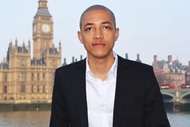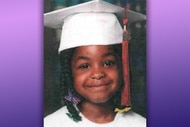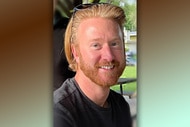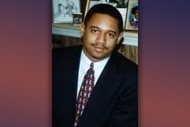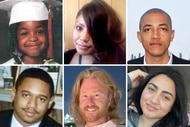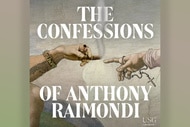Justin Ling Uses Bruce McArthur Murders To Highlight LGBTQ Activism In New Podcast "Uncover: The Village"
"Uncover: The Village" delves into the Canadian police force's strained relationship with the LGBTQ community and the fallout of the Bruce McArthur killings.

When police discovered human remains in a Toronto woman's flower pots in early 2018, what ultimately unravelled was a complex socio-political situation.
Serial killer Bruce McArthur was arrested on January 31, 2018 in connection to the disappearances of several men who had gone missing from Toronto's Gay Village between 2010 and 2017. He pleaded guilty to the murder of eight men on January 30, 2019 and was been sentenced to life in prison with no chance of parole shortly thereafter. In the wake of his shocking arrest, some even now believe McArthur may be connected to a series of cold cases from the 70s.
The question of how, exactly, McArthur evaded capture for nearly a decade has exploded into a larger debate about police practices in Canada — and more specifically about the way police deal with LGBTQ communities.
Justin Ling, an openly gay Canadian journalist, is highlighting the dialogue between law enforcement and queer people in Canada in a new podcast titled "Uncover: The Village." Through his extensive and highly sensitive investigation, Ling has spoken with many people connected to the murdered and missing men.
Friends of of the missing gay men who would later be determined as victims of serial killer McArthur claim they told police about McArthur's suspicious activities long before his subsequent arrest and conviction in April 2018. Police, meanwhile, made several statements which activists felt blamed the community for the ongoing deaths.
"We knew something was up. … We did not have the evidence," Toronto Police Chief Mark Saunders told the Globe and Mail. If anyone would know before us, it's people that knew him very very well. So that did not come out."
Ling countered the statements with his own experiences.
"I had spoken to multiple friends of the victims who came forward and said, 'I've been down to that police station and I told them about Bruce McArthur and I said this is who you need to be looking at,'" Ling told Oxygen.com. "Those friends verified to me that the police already had Bruce McArthur's name on their radar. Subsequent to that we had court filings that yes, they interviewed McArthur in 2013, and yes he had connections to multiple victims. So: the evidence is there! I don't feel like I need to obfuscate about it or dance around it."
Activist groups have also been outspoken with their criticism of the way the case was handled from the start, claiming that police were largely indifferent to the men who were missing because they were both queer and immigrants. Local LGBTQ organizations, including the The Alliance for South Asian AIDS Prevention, a wellness program in Toronto, hypothesized that anti-gay and racist bigotry prevented them from solving this case efficiently, noting that police investigations were only amped up after a white man was killed in 2017.
"We believe that the Toronto Police Service failed to provide adequate resources and effort in their investigations of the disappearances of Skanda Navaratnam (2010), Abdulbasir Faizi (2010), Majeed Kayhan (2012), and Selim Esen (2017)," the Alliance wrote in November of 2018. "It is saddening and unacceptable that it took the disappearance of Andrew Kinsman to reopen public interest in the cases of the missing South Asian and Middle Eastern men. Families and friends of the respective men were not given the closure that they deserved in a timely manner. We strongly emphasize that racism and homophobia are systemic issues that affect every part of our society. A different standard of justice for racialized and LGBTQ+ people is the reality in our city and province."
Another unsettling issue for many regarding the case is that the media coverage around the killings often left out the issues these tragic deaths have brought up and have ignored the activist work surrounding the fallout of the murders.
"It's sort of ironic: Part of the coverage is that the community was ignored or wasn't listened to for years. And then the media ignores the concerns and the needs of the community as well," Ling said. "There's a profound irony there. It's so typical for the coverage of marginalized communities. You want to highlight all the bad things that happened to them but you don't want to hear about their prospective solutions or the anger they're feeling. And this is exactly what marginalization looks like. It's painfully difficult."
Ling is now using his podcast as a way to highlight the conversation that activists have since had with police.
"What's great is that the eco-system I jumped into is one where the conversation is already happening. I wasn't out there forcing a conversation — the community did that," Ling explained. "And the friends and the family of the victims did that. And the city did that. And to some degree the police themselves did that. I can't think of any other cases where the police came out and — they didn't admit fault — but they did admit that mistakes were made and some things have to change. They admitted the criticisms were valid and thoughtful. I think it's one of the healthier conversations around policing ... I could say we went out there and forced them to listen but the reality is that's not what happened. The conversation was already beginning and was already going along quite well. Which is great! Makes my job a bit easier."
"To some degree we wanted to add to and augment that," Ling continued. "That's why [in the podcast] you hear from the friends about how they went to the police. And how they raised the alarm on this years ago, and the skepticism they faced inside the police force. Our goal was not to drive a wedge in there — because we don't need to — our goal was to highlight what people are already saying and give them a platform; both to provide information of what the investigation looks like but also to raise the concerns and criticisms about how that investigation was done and how the conversation after it transpired. Which I think is great! As a journalist, wherever possible, I'd rather highlight people are already saying it rather than having to come out and say it myself."
In "Uncover: The Village" Ling is careful when discussing police practices and specifically avoids placing blame on specific policemen, but instead examines the widespread structural issues at play.
"We're not out here to absolutely conclude wrongdoing by any individual officer or officers," Ling insisted. "We're just as much trying to talk about processes and practices of police and how they deal with these cases, especially of missing persons cases, especially of missing persons cases of queer people, and especially of queer people of color. So it's sort of a series of things, one on top of the other."
That being said, Ling does not hold back about noting specific biases in the police force writ large.
"I've also got to know some of the cops on this case over the years. I can tell you that any bias, at least on the officer level — on the homicide detective level — is mostly unconscious or unintentional. They mostly seem to strive, even as far back as 1978, to overcome their own cultural bias. We spoke to officers who made it a point to go and seek council from one of the most prolific and prominent queer activists of the day — which is not a insignificant task in 1978.
But at the same time, one officer told us they would go into a gay bar, they would go talk to people, they tried their best to be thoughtful and accommodating and respectful — but also he wouldn't eat or drink anything in the bar. Because he thought it was contaminated."
Ling sees this "interesting little parable" as emblematic of greater social difficulties.
"I do honestly believe these cops on the missing person's team did their best," Ling continued. "I don't think there was a sneering or laughing off of these cases. At least not by the officers I've spoken to. Evidently, there's always individual bad cops. But I think when you get too far down the rabbit whole of asking about individual cops, what individual biases exist — you miss the larger picture about how our institutions fail.
That's the conversation I think is the most important. Because our police force doesn't adequately take seriously missing persons cases, especially missing persons cases of men, especially missing persons cases of queer people. Especially because police don't necessarily recognize a queer person's friend circle as opposed to their biological family, which is a different kind of relationship in the queer community. Stuff like that. That is what I think is most important to focus."
As a Canadian member of the LGBTQ community, Ling has a clear personal investment in the subject matter of the new series. But Ling was quick to emphasize that he did not take his work home with him — and that his personal and professional life are very separate things.
"I think I've developed a routine of being very thoughtful about when I switch my brain off for the day, when I leave the office, having a social group and a support group that is wonderful and is willing to talk about anything else when I need that. That's true for my partner, for my friends, and for anyone else around me up to and including my dog," Ling said.
"When someone quotes me saying, 'Oh yeah, I'm fine.' I think it sort of undermines or ignores the point, which is that I don't really matter here. This is literally my career. I have a whole process for dealing with this. Who doesn't have that is the friends and family of these men — who are perpetually getting messages and calls from the media and strangers from the internet who have taken on this case as a form of spectator amusement. And that really messes with them! These people don't get an escape and I feel for them."
"Uncover: The Village" is currently available on iTunes.




